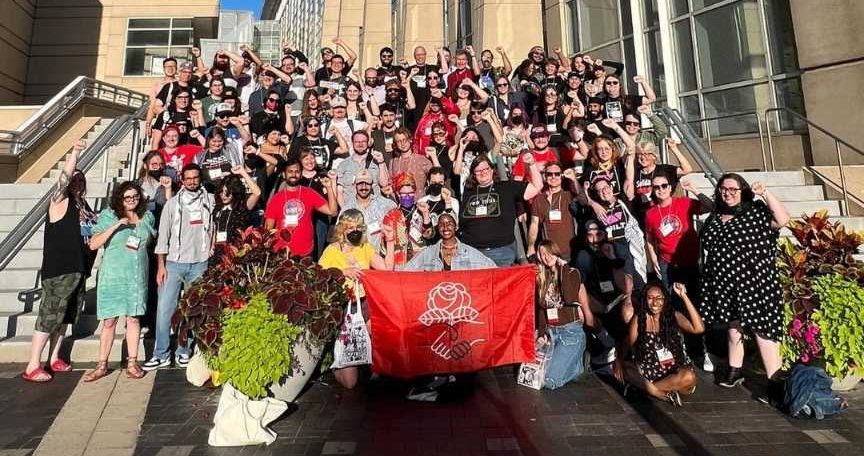by Gumbo V.
I had the honor of attending the 2024 Socialism Conference over Labor Day weekend. Socialism Conference has been hosted by Haymarket Books since the collapse of the International Socialist Organization (ISO) in 2019, before which the conference effectively served as an activist conference for members of the ISO. Since being taken up by Haymarket, however, the conference has taken on a more pluralistic, cross-tendency character that is rare among the western left. DSA members took on myriad roles at the conference this year, from speaking on panels such as Tenant Organizing and Social Housing for All and Bodily Autonomy and Trans Rights: Undoing Fascism at Its Roots, to hosting an entire pre-conference session focused on DSA the morning before the conference began in earnest. Alongside national DSA leaders and rank-and-file members were such big names in the US left as Ruth Wilson Gilmore, Vincent Bevins, Abdel Razzaq Takriti, Noura Erakat, Ashley Dawson, Linda Sarsour, Ilan Pappé, Roxanne Dunbar-Ortiz, Nick Estes, Daniel Denvir, Sarah Jaffe, and so many more—a veritable who’s-who of the western left and many of our international counterparts.
My conference experience conveyed three theoretical throughlines that set the tone of most discussions and perhaps demonstrate the dominant focus of the western Left’s theorizing: abolition, imperialism, and Palestine. From abolitionist geographers Ruth Wilson Gilmore and Lydia Pelot-Hobbs, to renowned anti-Zionists Ilan Pappé and Noura Erakat, the dozen and a half livestreamed keynotes of the conference hit on these three themes more than anything else, and they were woven throughout many of the smaller, unstreamed sessions as well. At first, I found the centrality of abolition a bit surprising given the overwhelming focus in the past 11+ months specifically on Palestine and the genocide being perpetrated in Gaza, with a secondary focus on the 2024 US election cycle and the interplay between the two. However, as Gilmore’s first session, Capital and Abolition, elaborated, abolition and the carceral nature of the state is so bound up in the many evils which we fight, that even when we are talking about other topics, we are often also talking about abolition.
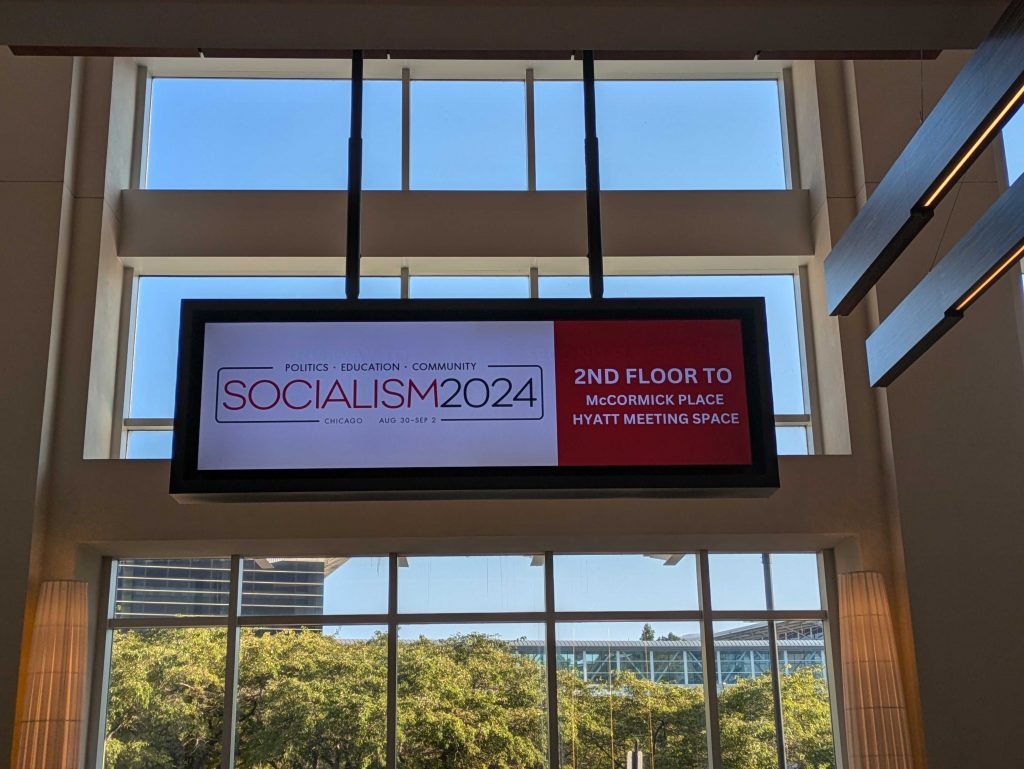
My surprise also comes in the context of the four years since the Summer 2020 Uprisings for Black Lives—the Left has thus far failed to grapple effectively with the aftermath of that tumultuous year, nor its implications for our collective future. A recent article in n+1 Magazine reflecting on the 2024 DNC in Chicago, just one week before Socialism Conference, ended with a rumination on the Left’s tendency to focus on moments of rupture, on planning for an impending rupture or looking backwards to argue over the historicity of this or that given event’s status as The Rupture. The question is not, however, which event was or was not the “real” rupture, but to accept that a rupture has already happened and to organize accordingly. As Nolan Perla-Ward stated in the article, “What could be more of a moment of rupture than 2020, and then October 7?” The onset of the COVID-19 pandemic lockdowns, followed almost immediately by massive global uprising against police violence and white supremacy, was the moment that the American Empire’s die was cast, and if socialism is our demand then we had best learn to keep up. What better method of learning to keep up could there be than continued focus on learning from our comrades in struggle at future Socialism Conferences?
DSA at the Conference
Let us turn first to the experience as a DSA member at the conference. This was not the first year that DSA has participated heavily in the Socialism Conference; at Socialism 2022, DSA essentially held a parallel conference that was dynamic and far-reaching in terms of attendance. Comrades hosted panels on the Emergency Workers Organizing Committee (EWOC), analyses of rank-and-file strategy and socialist organizing under a declining liberal democracy, and questions of multiracial organizing and party-building. In 2023, members of the 2021-23 National Political Committee (NPC) hosted panels on the future of DSA, organizing across differences, and rank-and-file organizing in large unions like the Teamsters and the Railroad Workers United reform caucus. I did not attend those conferences, so I cannot speak to the depth of DSA’s involvement throughout them, but in conversation with other comrades at Socialism 2024, DSA appeared to be less of an organization at the center of the conference. The question remains open whether this is a symptom of DSA’s declining membership, its sidelining in the struggle for Palestinian liberation due to complicated relationships with electoral politics, or a general flattening of the formerly dynamic character of the organization in the boom years of 2016-2020.
Nevertheless, DSA maintained a strong presence at Socialism 2024 and hosted a morning of pre-conference events specifically for DSA members. The panels, Building DSA Through Strategic Campaigns and DSA Reflections & Planning Beyond 2024, and corresponding breakout sessions, had cross-factional participation from across DSA. They were led by current and former NPC members from caucuses such as Red Star, Groundwork, Socialist Majority Caucus (SMC), Marxist Unity Group (MUG), and Bread and Roses (B&R), as well as uncaucused regular members. DSA Co-Chair Ashik S opened the DSA session with a speech thanking Haymarket Books for providing a space for DSA-specific discussions, noting that DSA members generally do not get the chance to gather in-person outside of National Conventions and the Socialism Conference, and that the sessions that morning might be a precursor to the renewed DSA National Activist Conference that was passed at the 2023 Convention. He went on to reiterate that DSA cannot simply organize people who are already ideologically aligned with the Left, but that we must organize people of all kinds and bring them to the Left. Comrades then went on to have a fruitful discussion about strategic campaigns that their chapters have run, such as the UAW Strike Ready, We Power DC (public power), Raise the Wage (rent control), and Uncommitted Washington campaigns. The reflections on these campaigns were modest, and grappled with questions of campaign structures, member recruitment, and how to prioritize limited chapter resources for one campaign over another.
The second panel focused on the recent history of DSA as a mass political organization, what challenges we have faced, and what tools have helped us overcome them. The tone of this panel was more triumphant, but still sat with the soberness of reflection. Comrades discussed the massive amount of administrative work that goes into keeping a chapter running and how having part-time staffers has helped alleviate administrative burdens from political leadership in larger chapters like NYC and Chicago. They also advised against hashing out internal political disagreements on Twitter and other platforms that Asad Haider calls “the media apparatus of the enemy.” Interestingly, many comrades pointed to Slack as a disorganizing/demobilizing communications platform and discussed moving to Discord, WhatsApp, and email newsletters for most communications. Co-Chair Megan R closed out the DSA session reiterating what comrade Ashik said previously: that we are at a critical juncture in the United States and in the Left especially, that it is empowering to gather together for these important, high-level discussions, and that we must find ways to work together across or through political differences because we are comrades, and thus united in a shared struggle.
Factionalism in DSA: Finding Common Cause Through Struggle
Participation in the conference proper broke down some of those high concepts of shared struggle and comradely gathering. I noticed—and must admit to my participation in—a breaking out of DSA members into smaller groups along well-trodden factional lines as the weekend began. This was not an organized dispersal, but rather something we can understand as an organic development of the rare in-person gathering of comrades who are more accustomed to interacting online any other day of the year. Socialism Conference is unlike the National DSA Convention in that members who attended are more likely to be in the most activated layer of their chapters and seemed to predominantly belong to one caucus or another as a result of their high activation. Comrades who belong to a caucus, or who are in the orbit of a particular caucus, tend to interact more with members of their caucus in other chapters than with general members in other chapters. Taken together, these dynamics point to an understandable choice for members to socialize with comrades they are more familiar with from online interaction.
Nonetheless, the factional dynamic led to a situation where some members seemed to be attending parallel, but distinct, conferences throughout the weekend. Members of some factions, such as Groundwork and SMC, generally appeared to attend panels about the rise of the far right and legislative organizing, whereas members of factions like Red Star, MUG, and Reform & Revolution (R&R) appeared to attend panels about mass work organizing, theory, and internationalism. The above example is by no means definitive, nor should it be taken as a matter of fact—it is merely my limited observation. However, it does point to a broader issue among the DSA cadres in attendance: we did not successfully come away from the conference with a common conception of how to collectively build socialism in the 21st Century United States. It was not a conundrum specific to DSA either; the same can be said of the conference as a whole, and the other large socialist organizations in organized attendance, like the Freedom Road Socialist Organization, the Maoist Communist Union, and the Tempest Collective.
Towards a shared, emancipatory political horizon for DSA
Let us consider the ramifications of factionalism within DSA in terms of how it was displayed at Socialism 2024 Conference. Sectarian conflict has long been part and parcel of the national politics of DSA and, similarly, it has been a familiar dynamic across the Left for generations. However, the minor factionalism at the conference is not representative of a deeper rift within DSA so much as it is indicative of a movement that has faced significant growing pains in the roughly eight-year period of rapid growth and Left resurgence. The factional disagreements throughout DSA do speak to real political differences between comrades, but they are also emblematic of an organization that was essentially re-founded around a massive, unifying project (the 2016 and 2020 Bernie Sanders presidential campaigns) and has since struggled to define itself in as all-encompassing of terms.
As our organization has exploded in growth, made real and serious strides in national and local politics, and found a new footing amongst a resurgent Left and a resurgent Labor Movement, we have had to face new questions: how do socialists govern in an extreme minority position? How do we relate to the utter disorganization of the working class en masse? How do we articulate a politics beyond the neoliberalism that has been dominant for longer than many of us have been alive? These are not simple questions, and in the face of large-scale defeats like the primary losses of Jamaal Bowman and Cori Bush and, especially since 7 October 2023, our collective inability to stop a genocide funded by our own tax dollars, it is once again understandable for comrades to turn inwards and lash out at one another in a fit of misdirected grief and frustration.
What is to be done, then? This is not a novel position to take, but what DSA needs now more than ever is a shared political horizon. The Workers Deserve More national program is a healthy start, but a shared political horizon cannot simply exist in the realm of slogans and programs. Referring back to Haider’s “On Depoliticization” quoted above, “The contemporary Left is mired in circular and disempowering disputes whose material implications are ambiguous… What is obscured by the affective intensity of these disputes is that in the absence of a guiding political orientation, they represent little more than forms of adjustment within the existing world, and therefore an investment in what is.” That is to say, without proper organization of a breadth and a depth hitherto unseen on the US Left in almost a century, coupled with near total loss of the transference of radical politics from one generation to the next thanks to the successes of COINTELPRO in the late 20th Century, we continue to argue amongst ourselves about how to interpret the current state of the world, rather than articulating how to change it. To do so requires organization, and it requires committing to each other as comrades, and not as fairweather allies in a temporary struggle.
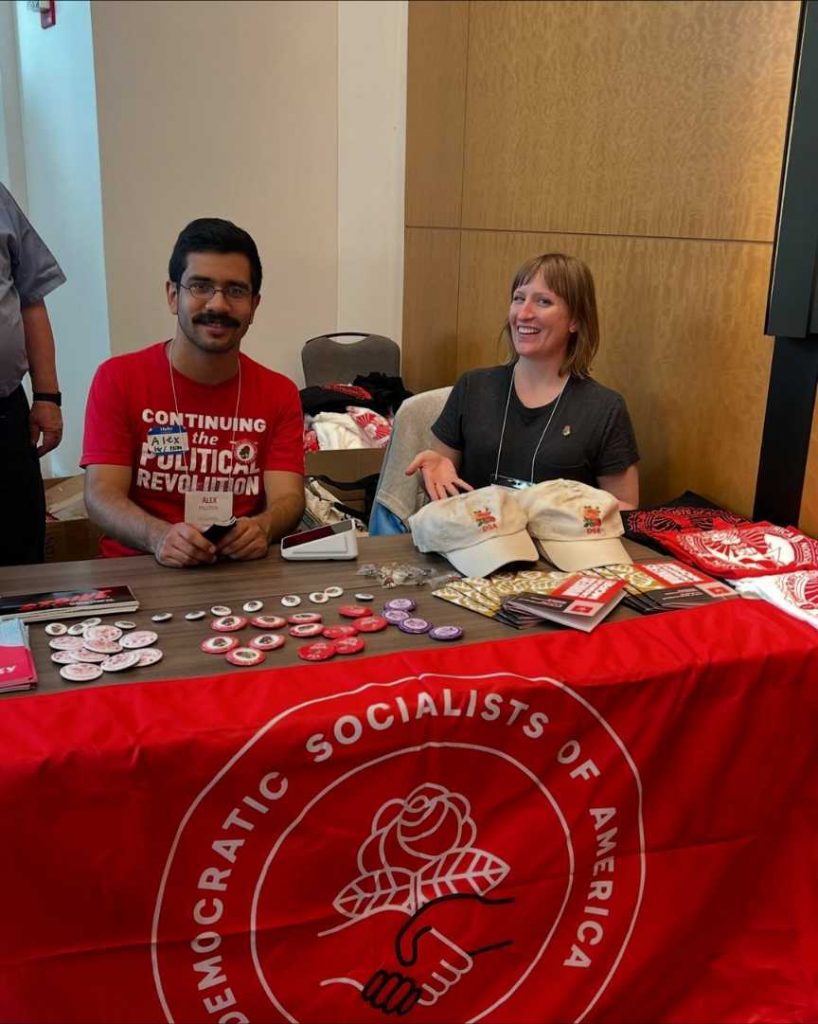
We will depart from this lengthy discussion on DSA with the most impressive case of an organized DSA presence at the conference, the so-called “Comrade Scribes.” As the conference got under way, most of the DSA members in attendance were invited to a large Signal chat and comrade Peter L of Northern Indiana shared a collaborative notes document with the group which contained the title of every session for the weekend and a space for notes. Comrades independently signed up to take notes on the sessions they planned to attend with the purpose of consolidating as much of the information as possible for comrades to review and reflect upon later. I am proud to have contributed to these notes on several sessions. The collaborative notes are now available for anyone in DSA to review, and though it seems a small act, it was a vast effort and a labor of love for each other that demonstrated the benefits of collectivity.
All Politics is Rehearsal
We shall now turn towards the content of the conference itself, beginning from the center of the weekend and working towards the periphery. I choose to begin in the center, with Ruth Wilson Gilmore’s panel, Lenin and the Politics of Rehearsal, because such a course mirrors my own path to understanding the key lessons of the conference. In her speech, which can now be found on Haymarket’s Youtube channel, Gilmore used both Lenin and the revolutionary playwright Bertolt Brecht as jumping-off points to discuss how all politics, and especially revolutionary politics on the Left, is a practice of rehearsal. For context, Brecht is perhaps most famous for his conception of “Epic Theatre,” a practice of playwriting that sought not to stir the audience to identify emotionally with the characters or action onstage, but rather bring the audience to a place of rational self-reflection. He wanted his audiences to be moved towards a critical view of the events onstage such that they would recognize injustice and exploitation and leave the theatre prepared to take action and change the world, rather than simply be satiated by an emotional, cathartic climax. To achieve this, he employed techniques that would remind his audiences that what they were viewing was only a representation of reality, and not reality itself.
She goes on to elaborate that Brecht and his comrades understood something that Lenin also understood, which is that as revolutionary socialists we must present an idea to society in such a way that those who are not already party to the idea (i.e. not revolutionaries) come to understand through the course of the presentation that the presentation itself, and thus the idea presented, depends on all of us collectively to bring it to fruition. Put more simply, all politics is a rehearsal of the world to come, and rehearsal itself is an ongoing process of interpretation and reinterpretation, not simply planning for a singular act by one party or organization. This begs the question: what kind of worlds are we rehearsing?
I returned to the subject of rehearsal again and again over the course of the weekend, applying the framework retroactively to all the previous sessions I attended or reflected on with comrades. One shining example of rehearsal in action came via the Religion at the Encampments panel hosted by comrades Maryam and Jonah from University of Chicago. They discussed the radical deployment of religion and ritual at the encampments that swept across universities worldwide during the Student Intifada in April and May of this year. The space that ritual held at the encampments could easily be viewed through a liberal lens as an indication of the multicultural nature of the camps, and thus their strength as a movement based solely on their use of representation or identity politics. Maryam argued, however, that while it could’ve been a tactical decision NOT to hold religious services at the camps, the decision to hold them openly was to decide that religion itself must be a terrain of struggle. Further, they proposed that religious institutions and ideology are key sites of social reproduction—places where people bring not only their bodies and their demands, but their spirit and the strength that it lends to the movement—and thus can be important displays of class struggle more broadly. Jonah built on this discussion with theses on the use of religion in the camps:
- The religiosity of Jews in the camps was a construction of a new Judaism in real time;
- The novel engagement with Jewish theology is the articulation of a Jewish identity politics specific to our current post-neoliberalism era; and
- A significant factor in the power and authenticity of this Jewish spirituality was its non-clerical character.
As a Jewish communist myself, I found this discussion especially engaging. The Zionist entity of Israel has long attempted to conflate Judaism as faith with Zionism as ideology, and in so doing, has created a class of clerical and secular Jews that are beholden more to Zionism than Judaism. However, there is vast potential for liberation in theology, and one need only look to the liberatory analyses of religious scholars across generations to find it. The radical deployment of Judaism as faith in the movement was thus integral to the militancy of the movement, and constituted a rehearsal of a new, liberatory, and anti-Zionist “Judaism of the barricades.”
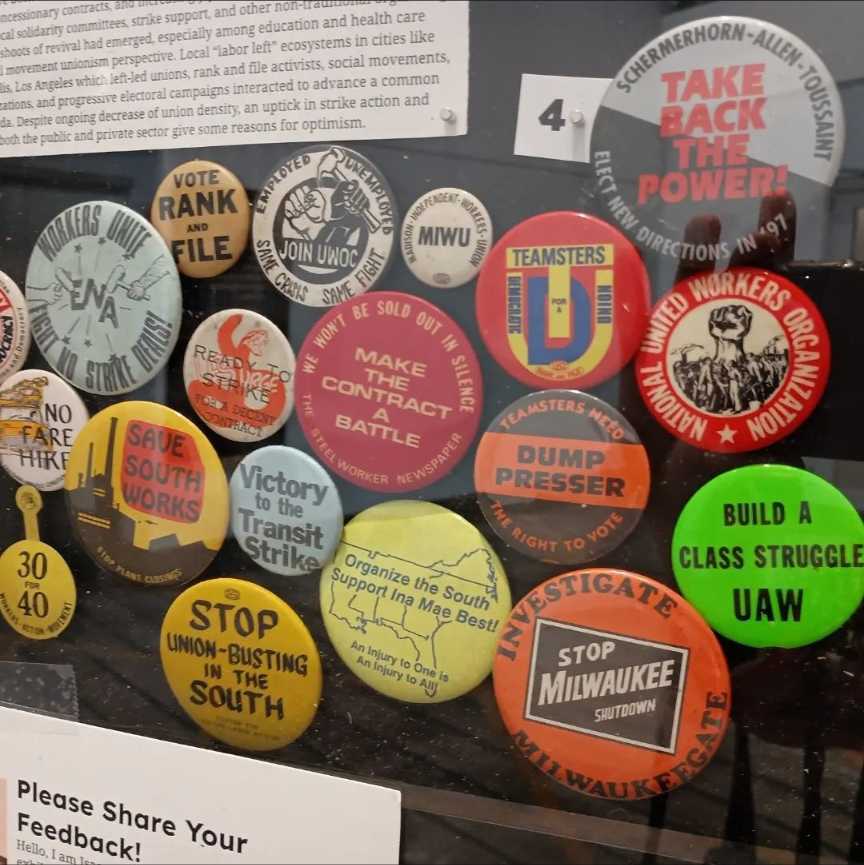
In all politics, but especially in a moment of unrecognized rupture, rehearsal is crucial to building the world we hope to see. We are socialists and communists. We understand that labor is the source of all value, and labor is entitled to all that it creates. Not only does that mean that organizing on the basis of our waged labor is fundamental to abolishing capitalism, but that there is labor to be done and value to be created outside of the capitalist system, in doing things that bring us our humanity back.
Such was the crux of the Logoff and Meetup: Building Third Spaces to Change the World session, which featured speakers from Pilsen Community Books, P.O. Box Collective, and East Side Freedom Library. Third spaces, first theorized by sociologist Ray Oldenburg in 1991, “host the regular, voluntary, informal, and happily anticipated gatherings of individuals beyond the realms of home [first space] and work [second space].” As capitalism is founded on the alienation of workers from the products of their labor, it must also alienate workers everywhere from each other, which has led to an epidemic of loneliness wherein more than 50% of adults in the US report experiencing loneliness in a given year. While loneliness is not an expressly material condition on its face, it has dire material consequences, carrying a greater risk of cardiovascular disease, dementia, stroke, depression, anxiety, and premature death. It also carries greater risks for the kinds of societal alienation that contribute to criminalized behaviors and thus to increased incarceration. It is in this context that we must consider the importance of third spaces for Left organizing. The “Logoff and Meetup” panel conveyed practical steps for creating and operating third spaces, but also sowed seeds for understanding the centrality of abolition to every other discussion held at the conference. The carceral state would love nothing more than to leave loneliness untreated and jail more and more people to justify massive capital expenditures on the prison industry. We must rehearse and create alternatives.
The Capital and Abolition panel with Ruth Wilson-Gilmore and Lydia Pelot-Hobbs discussed in detail the sheer amount of capital spent on prisons, especially in the US Gulf South. They pointed to the windfall of oil money as a driving force behind Louisiana’s massive capital investment in state prisons like Angola State Penitentiary, contributing to an increase in incarceration of around 4,000 in 1970 to 40,000 by 2010. The state was able to directly fund the construction and renovation of prisons in the late 20th Century rather than relying on finance capital largely because of the OPEC oil embargo of the 1970s driving up demand for domestic oil production. Flush with cash, Louisiana invested in carceral systems rather than public goods because of what the speakers described as the “anti-state state.” This comes from a framework of understanding the state not as a single, immutable entity but as a collection of institutions and organizations that are in contradiction to one another, riven with problems and often in direct competition for shares of the total state budget. These various state organizations are all funded by the same stolen social wage, that is the labor value of all workers, taken through state taxes and other forms of coercion, and used for public goods that are only possible through such massive collectivization of labor and value.
The “anti-state state,” then, is a particular kind of state that tends towards fascism and is based on a politics that considers the state’s provision of public goods as the core problem to be addressed, and funnels money into militarism and policing to prevent the use of state funds for anything but violence. The speakers contrast this with the “pro-state state,” which is a kind of state that is theoretically run by and for workers on the grounds that their social wages must be put to use for common, public goods that allow for the flourishing of all life: public transportation, clean air and water, free education, healthcare, and so on. Such goods cannot really be achieved through mutual aid or voluntarism alone, which serve as valuable rehearsals of what a real workers state might achieve, and which is why the state is such a key terrain of struggle even in abolitionist and anti-imperialist organizing.
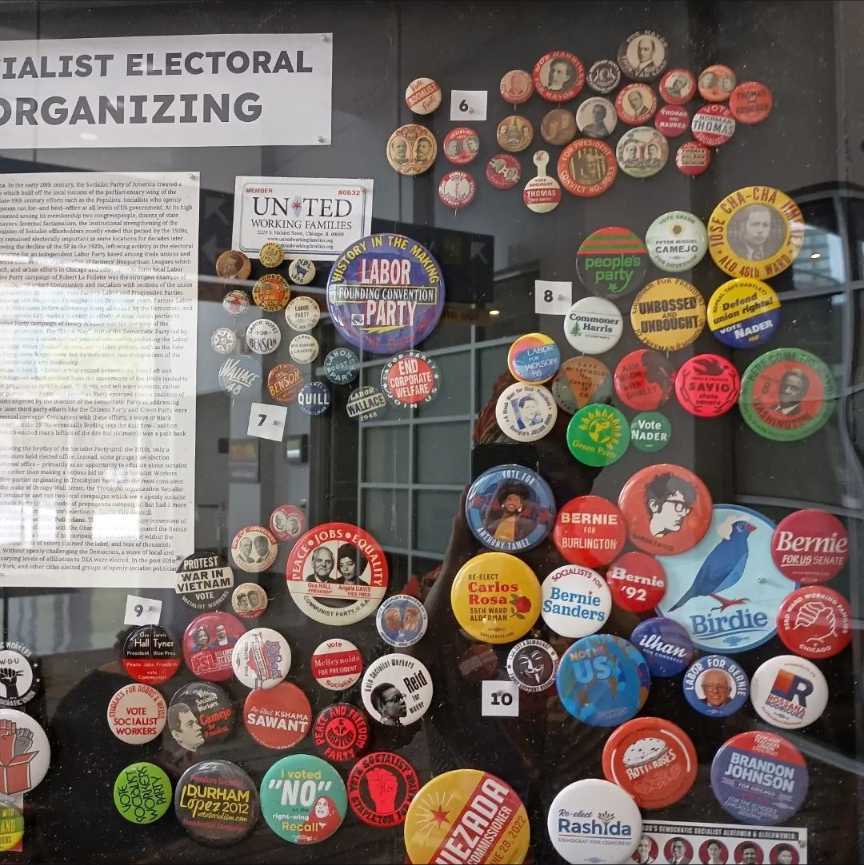
The OPEC embargo referenced above was itself a direct consequence of the militarized anti-state state and US imperialism in the Arab world vis-a-vis its support of Israel in the 1973 Arab-Israeli War. Such imperialism has only been emboldened and re-entrenched since Palestinians took History into their own hands on 7 October 2023, which has necessitated new forms of combatting imperialism at home and abroad. At the From the River to the Sea: UAW Labor for Palestine panel, comrades working as public defenders, electricians, and grad students all organized under the United Auto Workers (UAW) discussed their approach to labor organizing that is internationalist in scope and anti-imperialist in principle. The panelists, including Michael Letwin, Marcelina Pedraza, Sherena Razek, and Shahinaz Geneid, discussed their firm belief that workers deserve good union jobs, high wages, free healthcare, and everything else which their labor creates, but that none of it should come at the cost of their moral compass or their unwavering solidarity with workers around the world. Sherena in particular discussed her visit to Ramallah in the West Bank last year and how the day she returned to the US, a general strike was called by the Palestinian General Federation of Trade Unions in protest of the Israeli invasion of Jenin. Such massive strikes happen often in Palestine, and draw on a rich history going back to the Great Arab Revolt of 1936, which began as a general strike against collaborating British and Zionist capital and imperial interests.
All politics is a rehearsal for the future, so we must ask ourselves: what are we rehearsing? With the same stroke that we are abolishing capitalism, what are we creating?
Palestine is Everywhere
This brings us to imperialism and, consequently, to Palestine. Palestine hung over the entire conference weekend. The spectre of genocide and the US left’s heretofore impotence to defeat such evils was felt in every corner of the conference center and in every panel and workshop. Small details were the first I noticed: a shrine to the martyrs in Gaza, posters from Visualizing Palestine plastered across the walls, conference attendees draped in keffiyehs and clothing announcing “Not In Our Name” or other slogans and imagery of the struggle for Palestinian liberation. Even the banner for the conference itself depicted protestors flying the Palestinian flag while surrounded by smoke, above the words “Socialism 2024.” To say “Palestine is Everywhere” is not just to make a moral argument, but a material one.The topic permeated almost every session in one way or another.
How deep the connection would run came into focus during the Opening Plenary on Friday evening, titled All Eyes on Palestine: Solidarity, Liberation, Intifada and featuring historian Abdel Razzaq Takriti, Rabbi Brant Rosen, poet George Abraham, lawyer Noura Erakat, and community organizer Linda Sarsour. I wept often at the conference, but I wept the most during that plenary session. The unimaginable horror of this genocide was present in the room, especially as Rabbi Brant Rosen of Tzedek Chicago reminded us all that, “We are living in a time of genocide,” and the Palestinian poet George Abraham read their out long-verse work eulogizing Gaza and evoking the overlapping imagery of bombs and freedom. Not a single eye was dry. Beyond the sheer immorality of the Israeli apartheid regime, the material consequence of their violence was brought to bear throughout the plenary. Every bomb dropped on Gaza, every bullet and missile fired at Lebanon and the West Bank, is paid for by us, however indirectly. In purchasing those arms, the Israeli regime consequently funds our class enemies so directly that they have immense capital to repress our unions, hike our rents, and kill us in the streets when we dare to speak up.
Palestine is Everywhere because, as with the southern border, as with the Gulf South, as with Global South more broadly, Palestine is a vision of our collective future should we fail to dismantle capitalism in our lifetimes. Hyper-militarized border violence, the most extreme surveillance state on earth, restrictions on water and electricity and on life itself. This is what fascist want, and it is what capitalists and liberals will give them if it means they can nominally stay in power just a little longer for just a little more profit.
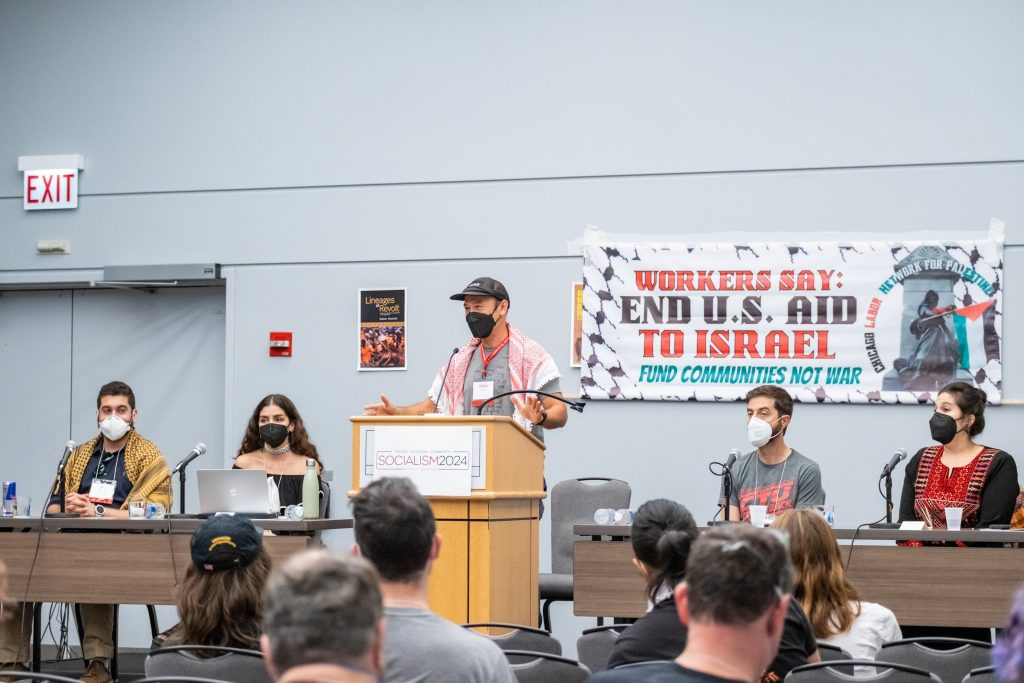
With ever more resources flowing into police departments and militaries, the state requires an outlet for the excesses of death capital. It sends that excess out to the periphery of the American Empire in the form of weaponry, funding, and physical boots on the ground. We are not innocent in this, as evidenced by the sessions “From the River to the Sea: UAW Labor for Palestine” and Blue Collar Empire: On the History of the ‘AFL-CIA’ and Possibilities for Labor Internationalism. Whether it is our tax dollars or the literal fruits of our labors, workers in the US are often materially implicated in overseas imperialism. This has been a bugbear for the Left that points to inherent contradictions even within DSA. We are stuck between the rock and the hard place of needing to hold power in the US government as it exists, while having to grapple with the extreme pressures that such a position places on us to conform to imperial pursuits. We have very clearly not resolved this contradiction.
And when we fight back against that fascist disaster nationalism? We will surely be shot where we stand. Palestine is teaching us how to resist, how to be free. Palestine is teaching us that freedom is not just a noun, but a verb. An action that we must take before it becomes a distant memory. In the words of rapper-activist Usaama Minhas, “Palestinians are already free, it’s Palestine that we are freeing.”
A Discourse on Grief
Palestine is teaching us to grieve again, too. Another of the keynote panels, From the Ashes: Grief, Care, and Time in our Movements discussed how grief, a fundamentally human experience that is incomprehensible to capitalism, can be both disruptive and revolutionary. Grief does not happen linearly. It cannot be optimized or streamlined. Grief happens on its own terms. It does not bow to the whims of a 9-5 or an assembly line. It is our right to grieve, and in our grief, we are able to make peace with the losses we have taken, with the family, friends, lovers, and comrades we must put to rest. When we allow ourselves to grieve, and to really feel that grief, we are feeling our humanity returning to us, and then we are able to return to the struggle in front of us. The struggle against all those systemic forces which force grief upon us too soon in this short life.
I did not grieve on 7 October 2023, as Palestinians in the besieged Gaza Strip took History into their own hands. I didn’t even grieve on 27 October 2023, when Israel began its ground invasion of Gaza. Months and months of footage streamed directly to my phone of murdered children, maimed bodies, and unimaginable destruction, and I only really began to feel my grief upon hearing a new song from the working class folk singer, Nick Shoulders. Grief is nonlinear, its intricacies unfathomable, and thus it opens space for us to struggle on ever-changing terms.
Grief is incompatible with capitalism. Capital wants us back to work as soon as possible after we experience a loss, but grief does not abide by profit margins and work schedules. Grief also does not abide by the confines of organization. That may be part of why we in DSA have struggled so much internally since the start of Operation al-Aqsa Flood on 7 October. The sheer horror that we have borne witness to in the last year and change has forced us into a perpetual cycle of organizing, mobilizing, and action, with very little space and time devoted to grieving, healing, and communing. The scale is so great that we cannot but feel urgency in every waking moment and often even in our sleep, but without time to grieve and to build, we will eventually run out of fuel. We have carried such immense grief for the crimes against humanity, compounded by our own various individual grieving, and we have learned in real time that we simply do not possess the power to actually stop these horrors. How can we deal with that? What kinds of worlds are we rehearsing, wherein we have the tools to halt and prevent genocides, to grieve in the same breath as we organize, and to struggle through our pain?
Personally, my grief has given me no patience for semantics. No patience for masking politics behind procedure, or for turning on my comrades because, seeing as I am unable to harm the Israeli and American regimes, I will harm those around me instead. My grief has given me anger, and it has given me purpose. I invite you to grieve as well, that together we might find a way through.
Conclusion, or Why DSA Members Should Attend
I could not begin to summarize the entirety of the conference weekend into a single piece of writing. Whole articles could be written on individual sessions alone! In four days, I moved from being on the very furthest edge of burnout, just a few bad days away from quitting DSA outright, to feeling reinvigorated by the dynamism and vitality of the socialist movement. I met comrades from all across the country, from all corners of the movement we call home, and I learned more than I could have ever imagined, both in sessions and in between.
As the largest socialist organization in a generation, more DSA members should attend Socialism Conference every year. As mentioned above, DSA passed Member-Submitted Resolution #16: Renew the National Activist Conference at the DSA National Convention in August 2023, which called for the DSA National Political Committee and DSA staff to plan National Activist Conferences in the years between annual conventions. Given the tight budget that the new NPC has had to contend with, and the continued presence of COVID-19 and other public health crises, it would make far more sense to put that effort into the Socialism Conference, leveraging the existing structure and logistical support of Haymarket Books to inject even more committed organizing into an already phenomenal conference. Focusing on an existing conference that brings in comrades from across the Left would also contribute to DSA’s position in a broader Left coalition across the United States and cement our standing as a socialist organization with strategy, wisdom, and power.
I will be attending the Socialism Conference in 2025, scheduled for July 4th weekend in Chicago. I invite all my comrades reading to attend with me, and together we can sharpen our tools and recommit to the struggle ahead. Remember: we are in this for the long haul. We do not have time to waste on petty squabbles and interpersonal conflicts, we have a fucking world to win, and nothing to lose but our chains. Onward, comrades!

